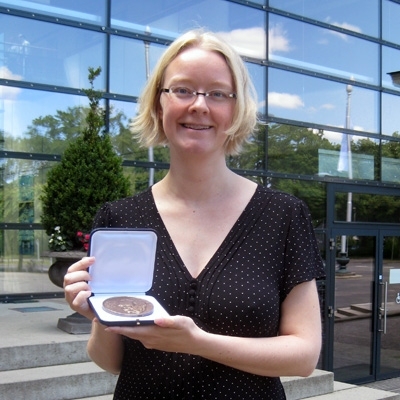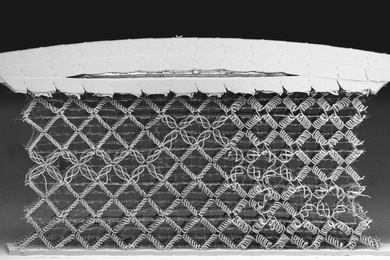Sarah Weigelt, a Simon's Initiative for Autism and the Brain at MIT postdoctoral fellow working in lab of Nancy Kanwisher, has been awarded the Otto Hahn medal of the Max Planck Society. Weigelt won the award for her PhD thesis titled “Neurovision: neuroimaging investigations of illusory perception."
In her doctoral work, Weigelt used functional magnetic resonance imaging (fMRI) to find neural correlates of visual illusions such as apparent motion and visual completion.
The Max Planck Society — one of Germany’s leading research organizations — honors their 40 best out of 2,000 young scientists per year with the Otto Hahn Medal for outstanding scientific achievements. The prestigious award takes its name from the German chemist and Nobel Prize laureate Otto Hahn, and is intended to motivate young scientists to pursue careers in academia or at a research facility.
Weigelt received a MA in philosophy and a MSc in Psychology from the University of Duesseldorf, Germany, in 2004, and in 2008 received her PhD in cognitive neuroscience/psychology from Maastricht University, The Netherlands. She continued her training in Wolf Singer’s laboratory at the Max Planck Institute for Brain Research in Frankfurt am Main, Germany, where she focused on neuroimaging investigations of human visual perception.
Weigelt is interested in many aspects of human visual perception from very basic processing, such as that of oriented lines and moving patterns, to higher-level perception of faces. Her current work in Kanwisher’s lab (in collaboration with Rebecca Saxe) combines psychophysics and fMRI to understand the development of face perception, one of the core functions of social cognition, in children with and without autism. With this work she hopes to further our understanding of how typically developing children and those with autism perceive the world.
In her doctoral work, Weigelt used functional magnetic resonance imaging (fMRI) to find neural correlates of visual illusions such as apparent motion and visual completion.
The Max Planck Society — one of Germany’s leading research organizations — honors their 40 best out of 2,000 young scientists per year with the Otto Hahn Medal for outstanding scientific achievements. The prestigious award takes its name from the German chemist and Nobel Prize laureate Otto Hahn, and is intended to motivate young scientists to pursue careers in academia or at a research facility.
Weigelt received a MA in philosophy and a MSc in Psychology from the University of Duesseldorf, Germany, in 2004, and in 2008 received her PhD in cognitive neuroscience/psychology from Maastricht University, The Netherlands. She continued her training in Wolf Singer’s laboratory at the Max Planck Institute for Brain Research in Frankfurt am Main, Germany, where she focused on neuroimaging investigations of human visual perception.
Weigelt is interested in many aspects of human visual perception from very basic processing, such as that of oriented lines and moving patterns, to higher-level perception of faces. Her current work in Kanwisher’s lab (in collaboration with Rebecca Saxe) combines psychophysics and fMRI to understand the development of face perception, one of the core functions of social cognition, in children with and without autism. With this work she hopes to further our understanding of how typically developing children and those with autism perceive the world.






